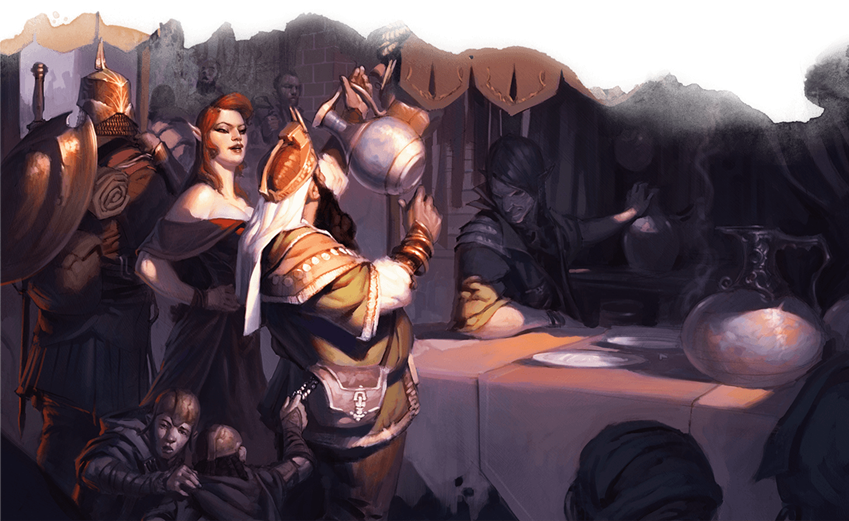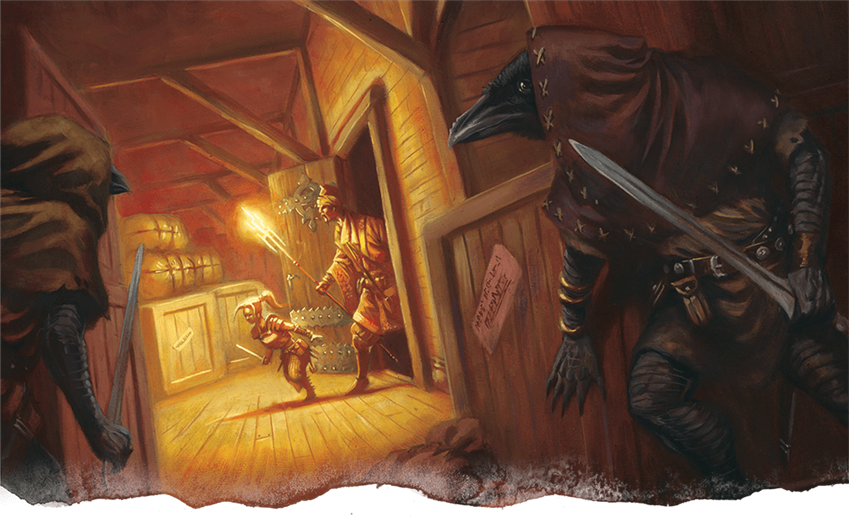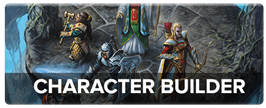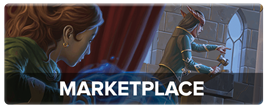House rules can make your D&D games more epic. If your game features lots of ability checks, and your characters use their skill and tool proficiencies all over the place, this new Talented Checks house rule can speed up your game, make your characters feel more like competent heroes, and make it easier to run mystery and social intrigue adventures. Let’s talk about Talented Checks!

Talented Checks
This house rule is short and sweet. Let’s start by stating it plainly here, and then we’ll dive into the nuances, interactions, and side effects this rule has as it echoes throughout the rest of the D&D rules. Here’s the house rule in its entirety:
If you’re proficient with a skill or tool, you automatically succeed on ability checks using that proficiency if the DC of that check is equal to or lower than 10 + your modifiers that apply to that check.
This is a fairly simple house rule, but it can have a massive impact on how your D&D game runs. It’s well-suited to social intrigue or mystery stories (like Waterdeep: Dragon Heist or adventures like The Styes in Ghosts of Saltmarsh), or any other adventure in which characters are expected to make a lot of checks.
This house rule even has uses in dungeon-crawling tales like Waterdeep: Dungeon of the Mad Mage, since it makes each class’s identity in the dungeon even more distinct. If a fighter has proficiency in Athletics, giving them the ability to automatically succeed on easy Strength (Athletics) checks lets their player feel like a competent action hero—which is the core of their class. Likewise, rogues can confidently pick locks that aren’t too beyond their skill, and wizards can comfortably succeed at Intelligence (Arcana) checks to decipher magical secrets, making them feel like all that studying they did in Candlekeep was worth something in the long run.

Passive Checks vs. Talented Checks
Most D&D players are at least passingly familiar with passive checks—particularly the most common type of passive check, a passive Wisdom (Perception) check. Your passive Wisdom (Perception) score is listed on your character sheet, and that value is equal to 10 + all modifiers that normally apply to the check, such as your Wisdom modifier and your proficiency bonus (if you’re proficient in the Perception skill).
Talented checks use the same formula as passive checks for determining success and failure, but they work differently. Here are some distinctions to keep in mind if you’re using this house rule.
Passive checks are always on; talented checks aren’t. When you enter a room in a dungeon, you automatically succeed at any Wisdom (Perception) checks that have a DC equal to or lower than your passive Wisdom (Perception) score. Even though a talented check can automatically succeed, you still need to actively choose to make an ability check.
You need to be proficient to make a talented check. Anyone can make a passive check. For instance, you still have a passive Wisdom (Perception) score even if you aren’t proficient in the Perception skill. Your passive score in that case is equal to 10 + your Wisdom modifier. Talented checks, however, can only be made by people who are proficient with the skill or tool being used. This helps protect the usefulness of characters that have invested resources into mastering a certain type of skill or tool.
Not all checks are passive checks, but any check can be talented. The rules of D&D aren’t clear on what checks can or can’t be passive. By the rules, any combination of ability scores and proficiencies can be made “passive,” but the only ones that are called out specifically by the rules are passive Wisdom (Perception) and passive Intelligence (Investigation)—the latter only shows up in the [feat]Observant[/feat] in the Player’s Handbook. That’s why those two passive scores are the only ones that appear on the D&D Beyond Character Sheet. If you want to make any other skill passive, you need to talk with your players (or ask your DM) and make it clear that’s what’s happening.
That’s not the case with talented checks. If you use this house rule, you’re making a clear statement to your players that if you’re proficient with a skill or tool, you can simply choose to succeed on easy checks using those proficiencies.

What about Reliable Talent?
Reliable Talent is a rogue class feature that allows you to “treat a d20 roll of 9 or lower as a 10” whenever you “make an ability check that lets you add your proficiency bonus.” This house rule is essentially expanding Reliable Talent to all characters, but with less dice rolling. This is only a problem if your game reaches 11th level and you have a rogue in your party; they’ll need to receive another mechanical bonus to replace the one that this house rule has essentially given to everyone.
A fine replacement for Reliable Talent is the bard’s Jack of All Trades class feature, which allows you to add half your proficiency bonus to any check that you wouldn’t otherwise add your proficiency bonus to. Even though its function is different, replacing Reliable Talent with Jack of All Trades as the rogue’s 11th-level class feature fulfils a similar role of improving their odds of success when making ability checks.
What about Temporary Proficiency?
Some class features, like the Knowledge Domain cleric’s Channel Divinity: Knowledge of the Ages feature, temporarily grants you proficiency with a skill or tool. Given a strict reading of the rules, this house rule allows you to make a talented check as long as you are proficient with a skill or tool; there’s no stipulation that you must always be proficient, just that you must be proficient when you make the check. This house rule certainly makes Knowledge Domain clerics better, but I don’t think it makes them particularly overpowered.
As with any house rule, it’s incumbent upon you and your table to work with your players and Dungeon Master to modify the rules to suit your needs.

What about Xanathar’s Guide to Everything?
Xanathar’s Guide to Everything gives Dungeon Masters and players a great deal of specific guidance on how to use tool proficiencies in fun and useful ways. Some of the fun of using these tool proficiencies relies on the tension of the dice; will you succeed at forging a signature with your calligrapher’s tools, even with its high DC? This house rule doesn’t make it more likely for characters to succeed at incredibly hard checks, but it does make it a guarantee that they’ll succeed at the easier checks, since they have to be proficient with a particular tool in order to attempt some of these specialized checks in the first place. I don’t think that this causes any problems, unless you really enjoy the uncertainty involved in possibly failing easy checks.
Xanathar’s also gives guidance on making downtime activities exciting. Some of these downtime activities involve making ability checks to determine how well you succeed at a certain activity. For instance, committing crimes while in town requires you to choose a DC, and then make several checks against that DC. If your characters just want a little bit of easy cash, it could become boring if they choose a DC that they can automatically beat using a talented check. Removing the risk of failure could make checks like this rote and mundane.
On the other hand, it’s up to you to decide if this is a bad thing or not. Your party may have a little more gold than usual, but what’s wrong with that? If one of your character is a master thief who just wants a reliable cash flow, let them live out the fantasy of pulling off a string of flawless low-profile capers week after week. But you’ve seen enough heist movies to know they’ll eventually want more, right? Thieves in movies, plays, and TV shows have massive egos and poor impulse control; they’re always looking for something bigger, badder, and shinier.
If this house rule causes crime (or whatever your players’ go-to downtime activity is) to become routine, try upping the ante yourself. Drop hints about the “Grand Diamond of Cormyr” being put on display in the Waterdeep Metropolitan Museum for a tenday only in one month’s time. This isn’t just a standard crime; this is a crime with DCs of 30 across the board. The characters are going to need to do a lot of legwork to rig these checks in their favor, and talented checks won’t help them here.
Do you have any questions about this house rule? How would you use it in your D&D games? And do you have any house rules of your own? Let us know in the comments!
Special thanks to @ThinkingDM for his thread about passive skills, which inspired me to revise and expand my original draft of this house rule.
Create A Brand-New Adventurer Acquire New Powers and Adventures Browse All Your D&D Content
 James Haeck is the lead writer for D&D Beyond, the co-author of Waterdeep: Dragon Heist, Baldur's Gate: Descent into Avernus, and the Critical Role Explorer's Guide to Wildemount, a member of the Guild Adepts, and a freelance writer for Wizards of the Coast, the D&D Adventurers League, and other RPG companies. He lives in Seattle, Washington with his fiancée Hannah and their animal companions Mei and Marzipan. You can find him wasting time on Twitter at @jamesjhaeck.
James Haeck is the lead writer for D&D Beyond, the co-author of Waterdeep: Dragon Heist, Baldur's Gate: Descent into Avernus, and the Critical Role Explorer's Guide to Wildemount, a member of the Guild Adepts, and a freelance writer for Wizards of the Coast, the D&D Adventurers League, and other RPG companies. He lives in Seattle, Washington with his fiancée Hannah and their animal companions Mei and Marzipan. You can find him wasting time on Twitter at @jamesjhaeck.











-
View User Profile
-
Send Message
Posted Aug 26, 2020Hey James, great article but when will homebrew horrors be back (i found it quite useful)?
-
View User Profile
-
Send Message
Posted Aug 26, 2020This same thing is in the dmg. Also homebrew horrors is very cool.
-
View User Profile
-
Send Message
Posted Aug 26, 2020I’m not sure how I feel about giving every character an 11th-level rouge ability. Still, neat idea.
-
View User Profile
-
Send Message
Posted Aug 26, 2020I don't think it's an apt comparison, actually. Reliable Talent lets a Rogue fudge a bad role in a couple of core skills, regardless of the roll's DC, while this optional rule only streamlines/replaces rolls for skills that a proficient character should be reasonably expected to succeed at anyway.
DC 10 isn't very hard except at very low levels and if your character has a negative modifier, so this rule essentially just eliminates all those times you'd roll "anything but a natural one" to succeed and aught to have been trivial for the character anyway.
-
View User Profile
-
Send Message
Posted Aug 26, 2020Isn't Insight also a passive skill? It shows up on the dndbeyond character sheets as one.
-
View User Profile
-
Send Message
Posted Aug 26, 2020Talented tool checks might be good, but I generally hate passive skill checks since they take the fun out of rolling dice in the game. If you do passive Athletics checks, pretty soon you're allowing auto-grappling and auto-attacking creatures and stuff. I dunno. I do like the idea of making the game go faster, and maybe this could work for like one type of check per character, meaning it's their specialty... I'll have to think about it.
-
View User Profile
-
Send Message
Posted Aug 26, 2020BAD JAMES! Just because you don't play Rogues doesn't mean you should give away their abilities to the world and think giving a Rogue a Bardic ability is a good idea.
Now that I have scolded you for insulting Rogues, I should point out that I don't consider Reliable Talent and Talented checks as mutually exclusive. It allows a Rogue to benefit from having more proficiencies early on, as well as Reliable talent being applicable to contested rolls as well (such as a grapple check). I don't think this steps on reliable talent in the way you expected it to.
Of course, if you have a Heroic Chronicle from Wildemont, a Supernatural Gift from Theros AND a class feature variant Ranger then your Half-Elf Rogue 1 Cleric 1 Ranger 1 is going to very much enjoy this rule, what with the 18 skill proficiencies they have! (If you have none of those you'd be a Human Scout Rogue 3 Lore Bard 3 Knowledge Cleric 1 with the variant feat of skilled to enjoy the same 18 skill proficiencies, 8 of which had expertise.)
-
View User Profile
-
Send Message
Posted Aug 26, 2020I think that this ability should only be given to proficiencies that have a mod of +7 or higher. That way it simply takes out the "Anything but a critical fail and you're good" situations.
-
View User Profile
-
Send Message
Posted Aug 26, 2020This isn't a new thing, or even a house rule, really. This is the same thing as "Taking 10". That's been around since before 5e. A character that is performing a familiar check can take 10 instead of rolling if they aren't under pressure. It's left up to the group to determine what constitutes being under pressure.
"Taking 20" is also a thing. This is where you can automatically take a 20 on a check if it is a check that you can try multiple times and have enough time to spend. You have to expend time as if you tried 20 times and automatically roll a 20. Again, the group can have discretion over where you can apply this sensibly.
-
View User Profile
-
Send Message
Posted Aug 27, 2020What about changing Reliable Talent to something like this?
"Whenever you make an ability check with an ability in which you are not proficient, you may add your proficiency bonus."
Yes, it would be essentially granting the Rogue proficiency in every skill, but they would not benefit from Talented Checks and this would not extend to tools, so I think it is a good trade and fine at level 11.
Edit: Idiot me, I should've just used Jack of All Trades wording with the additional buff:
-
View User Profile
-
Send Message
Posted Aug 27, 2020i don't know james... seems to me like you are removing the fun part of the game. rolling the dice.
sure it bogs the game down sometimes, but really players are there to roll dice. not just to roleplay stuff.
my players have started complaining to me that they haven't rolled any dice at all last game. and that it happens way too often.
this is why i don't use passive to begin with... the ability to take 10 or 20 was cool back in the days.. but the ability to always have 10 and above is ridiculous.
i had players with passives perception above 20 and always had to tell them, you see something odd about this and that wall. you see that trip wire over there and it entirely removed the fun of the game because the players were seeing everything as soon as they entered. they didn't even need to roll any dice.
let's be honest we're not there just for the story guys, we're also there to roll dice.
and a natural 1 on a fighter trying to break open a door is fun times too !
-
View User Profile
-
Send Message
Posted Aug 27, 2020i don't lke it, because it removes a core feature of the rogue, being awesomely good at what he does. instead of making him good at what he does, you make good at everything, but not awesome. the point of reliable talent is for the rogue to be awesome and never fail at what he does, exemple of stealting, exemple of investigating, or being perceptive. or even just hidding stuff up. now you just want him to be good at everything but not awesome. thats not the point of reliable talent. also, remember that giving him proficiency in everything means also initiative. as initiative is a skill check too. last point, by doing this you are giving him the bards core feature of jack of all trades, but a better version of it which gives entire proficiency instead of half. you don't want to give a core feature of a class to another class. Rogues and bards already have many things in common, the last thing you wanna do is to make them indistinct.
-
View User Profile
-
Send Message
Posted Aug 27, 2020Cool!
-
View User Profile
-
Send Message
Posted Aug 27, 2020Correction for the article. Passive Insight is also on DnDBeyond Character Sheets. Its not just Passive Perception and Investigation. It is also recommended by rules for Passive Stealth to be used for monsters to speed the game along as a benchmark for those rolling for perception.
-
View User Profile
-
Send Message
Posted Aug 27, 2020Your multiclass proficiency monkeys aren't going to see an ASI this side of level 6 (for the half-elf ranger) or lv 8 (for the human). So maybe that's a wash?
-
View User Profile
-
Send Message
Posted Aug 27, 2020I'm pretty sure all the abilities have passive checks by RAW, and the Perception (wisdom) and intelligence (Insight) are on the sheet for convenience. I don't see anything to indicate that the existence of the other passive abilities is in any way 'dubious'
-
View User Profile
-
Send Message
Posted Aug 27, 2020One of my favorite new sub-class concepts is the College of Eloquence Bard, specifically because of the Silver Tongue feature that allows rolls of 0-9 to be treated as a 10 for Persuasion and Deception checks. If using Talented Checks, is it best to just chuck this college out, or are there good ideas out there for a way to make it up to the rhetorician?
-
View User Profile
-
Send Message
Posted Aug 27, 2020So basically what you're saying is that anyone who's been trained at something will always succeed performing an easy task connected to that proficiency. If they also have the physics or psyche for it (ability bonuses), they will never fail at something that could be even harder. That feels about right I guess. My main gripe with proficiency checks is that sometimes it feels too "random" where I have characters that aren't proficient at something out shine characters that should have no problem succeeding with a task. This takes away or lessens that risk of that happening. I'm going to try it out for sure.
As you expressed interest in other house rules I'll give you one of mine - a variation on Instant Death
I want to run a game where my players' always know that there is a risk that they might die. Early on in a campaign, with low level characters, this risk is very tangible. But as characters rise through levels, the risk of dying goes away. At least from standard damage like that of a weapon attack. PH states that instant death happens if a character is brought to 0 hit points and the remaining damage of the attack is greater than the characters full hit points. This I think is too high, especially at higher levels. So I have a system where higher levels doesn't add that much to the number of negative hit points you can survive.
"When damage reduces you to 0 hit points and there is damage remaining, you die if the remaining damage exceeds your characters class HD + constitution modifier + 1 hp per level of your character."
This means a 6 level barbarian with a constitution of 17 needs to receive a "killing blow" that puts them at - 21 hit points where the PH system would have this set to 75 hit points (using average hp calculation), which means the risk of actually dying is more or less gone, removing the "nerve" in combat.
-
View User Profile
-
Send Message
Posted Aug 27, 2020No, he's removing the less fun part of the game: rolling WAY TOO MANY dice, for tasks that should be trivial for your character.
This whole concept is about translating that "you have proficiency" into "you've been training for this" and further into "what might be challenging for some is trivial for you". It's a rule that people who always train for strength find lifting 40-50kg boxes or opening lids trivial, or people who train to work with animals be able to tell if an animal is sick just by a cursory look. It's about not slowing down the game with rolls when the stakes are not really high so you can get to the parts when those rolls really matter.
-
View User Profile
-
Send Message
Posted Aug 27, 2020@James: I also have a nice little "house rule" (or more like, habit) to speed up the game by cutting down unnecessary rolls: buffering Stealth, Perception and Investigation rolls.
The first time in a session when someone makes a Stealth, Perception or Investigation roll (whether or not it's actually necessary) I ask everyone to make three checks of that skill and I note that down. During the session, whenever someone wants to make a check of that, and it is necessary, I use the first unused roll from their list, and if it's not necessary, I just tell they succeed / do not find anything. They are still required to announce the action, but don't need to roll more for a while. If they would have advantage or disadvantage at the point when I use the result, I add or subtract 5 as per with passive checks; and if they want to use other temporary bonuses like Bardic Inspiration, it will be added if applicable and ignored/wasted if not.
For example, the party enters a dungeon. In the first room they look for traps and hidden doors, and they want to advance silently. I ask everyone to make three investigation and three stealth checks and I write them down, but I know there's no traps or secret items, so I just tell them they didn't find anything. Later they enter a corridor where they are again look for traps, every 10 feet - I know there's one in the middle of the corridor, so I use their first Investigation rolls from my sheet when they get near the trap. I also know that there are no creatures in the first two rooms, but there's one on the third room, so if they say they will approach the third room stealthily, I will compare (and cross out) their first roll accordingly.
They did roll to use their skill, but they didn't have to stop the game every 10 feet by adding up numbers; and I also don't give out hints of traps or hidden enemies by only asking them to roll whenever it's relevant.